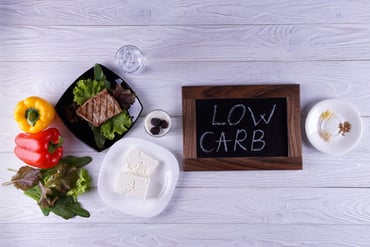Artificial sweeteners, also known as sugar substitutes, are commonly used as lower-calorie replacements for sugar in a variety of diet foods and drinks. I’m sure we’ve all noticed the small Splenda packets right next to the white and brown sugar in Starbucks, but how many of us have actually used them? And are they a better option simply because they are lower in calories?
What are artificial sweeteners?
To answer that question, it would be helpful to know a bit more about artificial sweeteners. As its other name suggests, sugar substitutes are primarily used as substitutes for sucrose, more commonly known as granulated or table sugar. Unlike sucrose (and sugars in general), which carry 4 calories per gram, most artificial sweeteners cannot be fully absorbed by our digestive system, and so provide little to no energy for our bodies. That’s we can find them all over the ingredient labels of sugar-free sodas, ice creams, fruit jams, and yogurt.
On top of this, their sweetness is often much more intense than that of regular sugar. When compared to sucrose (the baseline for comparison), some sugar substitutes can taste up to 800x sweeter, and so only minute amounts are needed! In fact, you might be able to taste bitter, or metallic off tastes if too much is added to a food product.
Sweetener | Relative sweetness | Calories per gram |
| Sucrose (table sugar) | 1 | 4 |
| Agave nectar | 1.4 | 3 |
| Aspartame (Equal) | 180 | 0 |
| Saccharin (Sweet n low) | 400 | 0 |
| Sucralose (Splenda) | 600 | 0 |
| Stevia (Truvia) | 300 | 0 |
Why are artificial sweeteners used?
Based on the properties mentioned above, artificial sweeteners seem to have a number of benefits in term of weight control and diabetes management. In an effort to combat the increase in obesity and diabetes cases, The American Heart Association and American Diabetes Association have given the nod of approval for many common artificial sweeteners. Including aspartame, saccharin, and sucralose.
With our busy lifestyles and long work hours, it’s hard to blame us for the high sugar levels in our diet when it’s just so convenient to eat out or reach for those sugary snacks. The WHO recommends a maximum of 10% of a day’s total calories to come from sugar (about 50g on a 2000 cal diet), but a single can of soda already contains 40g. That’s dangerously close to the limit without even accounting for the hidden sugars in our coffee, granola bars and sauces! By switching out your regular can of soda for a ‘diet’ version, you would drastically lower your sugar and total energy intake, which could be helpful for weight management.
Artificial sweeteners are especially useful for people with diabetes, as they can sweeten foods without affecting blood sugar levels. Diabetics can’t use the insulin hormone to process sugars normally, and so have to monitor their intake closely to avoid large fluctuations in blood glucose. Since artificial sweeteners cannot be absorbed, they won’t elicit an insulin response, which can help diabetics maintain stable blood sugar levels.
Does does that mean they’re good for me?
Well maybe, but probably not. While they can help with weight management in theory, more recent studies have had mixed results on their actual effectiveness. It sounds counter-intuitive, but effects of artificial sweeteners on the brain might mean that it’s actually linked to weight gain. Multiple studies have found that, when our brain is ‘teased’ with sweet tastes but not ‘rewarded’ with an increase in energy, it would send signals to conserve energy and increase our appetite. As a result, we’re more likely to reach for that cookie later on, leading to an overall increase in energy intake.
On top of this, new studies suggest that consistent and prolonged artificial sweetener intake may lead to insulin resistance, which could explain why a high artificial sugar intake is correlated with an increase in the risk of type 2 diabetes. When our bodies become trained to dissociate sweet tastes from calorie gain and feelings of fullness, it begins to pay less attention to sweet tastes. As a result, our ability to process normal sugars and carbohydrates weaken. Our bodies’ sensitivity to insulin release lowers, making us prone to spikes and crashes in blood sugar levels. This is especially bad news for those who already have type 2 diabetes!
It’s also worth noting that if you have IBS or any other GI problems, it would be best to avoid them altogether. Artificial sweeteners have been linked to aggravating symptoms such as gas and diarrhea because of how difficult they are to digest.
What does this all mean?
Although artificial sweeteners sound useful in theory, studies of their actual effects on our body paint a different, more complex picture. Currently, their long term health effects are hotly debated and still being studied, but a growing body of evidence suggests that they may more harm than good. While we can’t point fingers at artificial sweeteners for being a culprit in causing obesity, diabetes, and other health problems just yet, it would be best not to risk it. As hard as this is to say as someone with a sweet tooth, the safest and healthiest option is to avoid a sweet diet altogether, and save those sweet treats for a special occasion!
References:
Gardner, C., Wylie-Rosett, J., Gidding, S. S., Steffen, L. M., Johnson, R. K., Reader, D., & Lichtenstein, A. H. (2012). Nonnutritive Sweeteners: Current Use and Health Perspectives: A Scientific Statement From the American Heart Association and the American Diabetes Association. Circulation,126(4), 509-519. doi:10.1161/cir.0b013e31825c42ee
Pepino, M. Y., Tiemann, C. D., Patterson, B. W., Wice, B. M., & Klein, S. (2013). Sucralose Affects Glycemic and Hormonal Responses to an Oral Glucose Load. Diabetes Care,36(9), 2530-2535. doi:10.2337/dc12-2221
Swithers, S. E. (2013). Artificial sweeteners produce the counterintuitive effect of inducing metabolic derangements. Trends in Endocrinology & Metabolism,24(9), 431-441. doi:10.1016/j.tem.2013.05.005
Yang, Q. (2010). Gain weight by “going diet?” Artificial sweeteners and the neurobiology of sugar cravings: Neuroscience 2010. The Yale Journal of Biology and Medicine, 83(2), 101–108.


